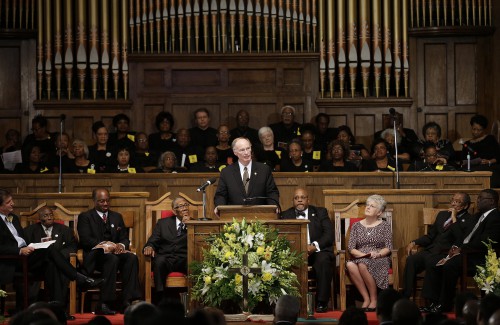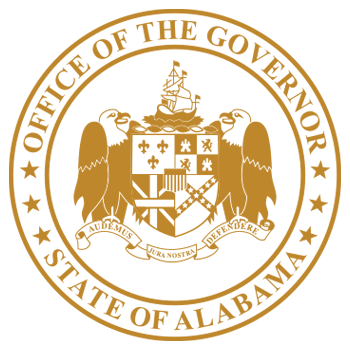Governor Bentley’s Remarks at the 50th Anniversary of the 16th Street Church Bombing Community Memorial Service

“As Birmingham goes, so goes the Nation.” No truer words were spoken than those expressed by Reverend Fred Shuttlesworth when he personally invited a young pastor to join him in the crusade for equality in Birmingham, Alabama.
That pastor, as we know, was Dr. Martin Luther King. And those words, spoken by Reverend Shuttlesworth turned out to be no exaggeration.
What a personal honor it is for me to join in today’s historic occasion in this place of worship that has become a monument in itself to the struggle for civil rights. These walls represent the strength, determination, the loss and pain that have come to define the civil rights movement in Alabama.
We are surrounded by the living examples of those who fought for equality, and won, and who have now dedicated their lives to the cause of justice. It’s an honor to stand here among you. On behalf of the State of Alabama, thank you for allowing me to participate in this momentous occasion.
Like many in Alabama in 1963, I never gave much thought to the segregated society we had become. Growing up in Shelby County, I never gave it much concern until the actions of brave men, women and even innocent children forced me to think about it.
In September of 1963 I was a 20-year-old student at the University of Alabama. I was there studying to practice medicine. Earlier that summer, on a hot day in June, I walked across campus where a large crowd had gathered.
Hundreds of fellow students, news reporters and police were outside the Administrative offices. The Governor of Alabama was also there. I remember standing on the sidewalk, when a police officer told me to get out of the street or I would be arrested. I recall the fear I felt at the age of 20 when threatened with arrest.
I can only imagine the fear that many here in this room- must have endured, and then overcome to keep fighting, pushing and challenging the need for racial equality in our state.
On Sunday, September 15th I was back at home for the weekend to attend services at my hometown church not too many miles from here. Having heard of the ongoing, and ever increasing acts of violence that had been taking place in Birmingham, I had begun to develop a greater awareness for the magnitude of what was happening in Alabama.
So when word spread that a bomb had claimed the lives of four little girls inside their place of worship, like many across the nation, I began to realize the extent some would actually go to in their forceful attempts to suppress men, women – and children – because of their skin color.
Four little girls, Addie Mae Collins, Cynthia Wesley, Carole Robertson and Denise McNair were now forever linked with the cause of justice.
The events of September 15th made the nation, and me really take notice, and fully comprehend what was taking place in our state.
The tragic and deadly bombing that spawned disbelief, outrage, violence, and rioting also inspired at least one person to stand up and declare publicly, “Birmingham is dead”.
By the time the sun set on that day, Birmingham and Alabama were forever scarred by hatred and anger.
What a contrast it was to the way the day began. It was Youth Sunday. Having seen the successful integration of Birmingham Public schools five days earlier, the children were front and center this day as they took on the responsibilities within the church which were normally reserved for adults.
I’m still struck by the title of the lesson that was taught that morning, “A Love that Forgives”.
It strikes me that during such turbulent times – in a church that served as a staging point for peaceful protestors – that while bombing, killings, beatings and humiliations had been perpetrated upon its very own people – this church chose to teach Love.
And Forgiveness.
And that lesson may have very well been forgotten had it not been for the hate-filled act that occurred that morning.
It’s a lesson we all must remember, and take to heart the words of Jesus in John 13 verse 35:,A new commandment I give to you, that you love one another; just as I have loved you, you are also to love one another.”
Birmingham may have been declared dead that day in 1963. That’s what the nation heard and believed at the time.
But Birmingham isn’t dead. It certainly still bears the scars of its turbulent past, as does our state. And at times those scars hide its true beauty.
Today we choose to honor the memory, the work and the sacrifice of those who saw a better vision for Birmingham.
Today we choose to look beyond those ugly scars and focus on what Birmingham really is, and what it can be.
What will Birmingham look like – what will Alabama look like – what will our nation look like 50 years forward?
That’s up to its people.
As those prophetic words were spoken 50 years ago, “As Birmingham goes, so goes the Nation.”
God Bless you All. And God bless the Great State of Alabama.
Provided by the Office of the Governor of Alabama | governor.alabama.gov

